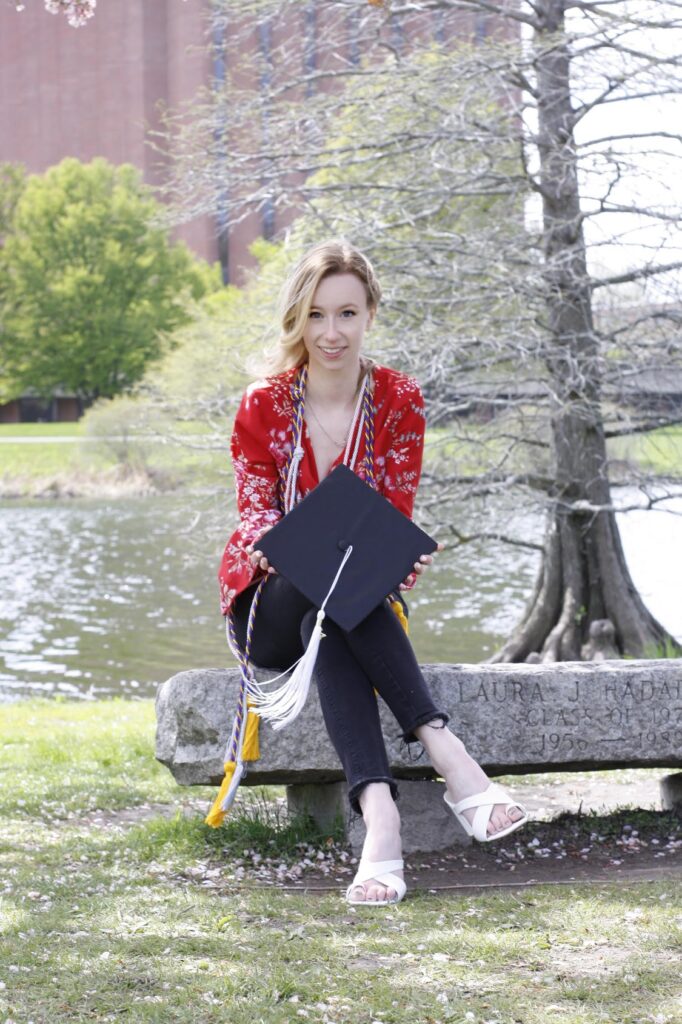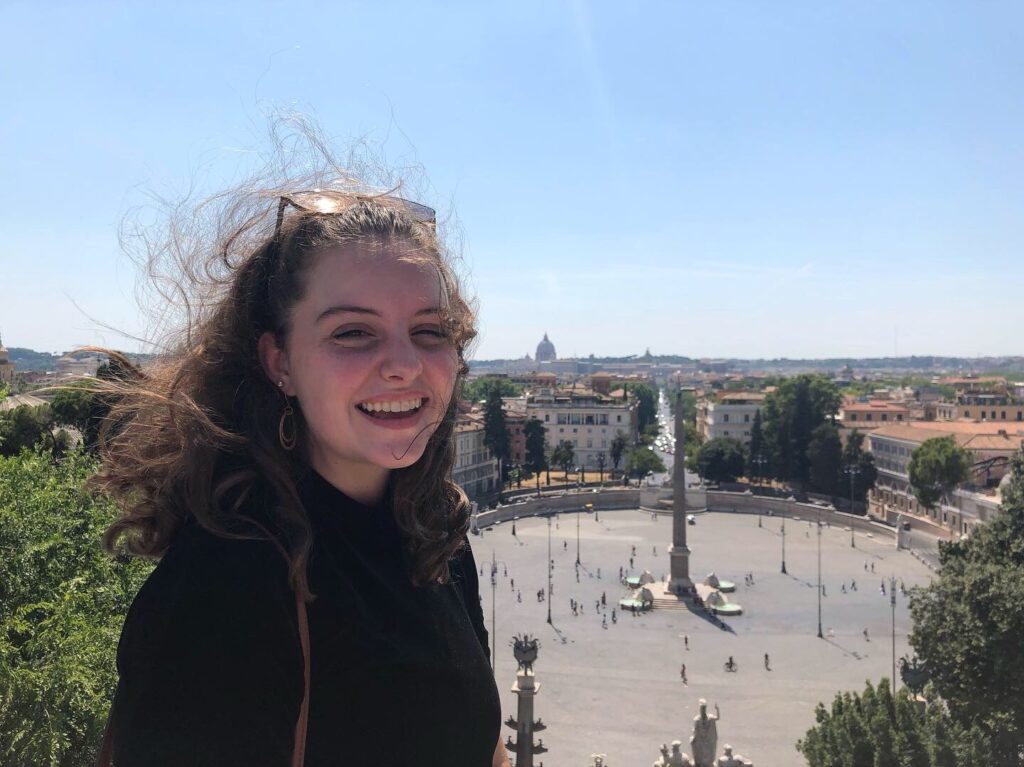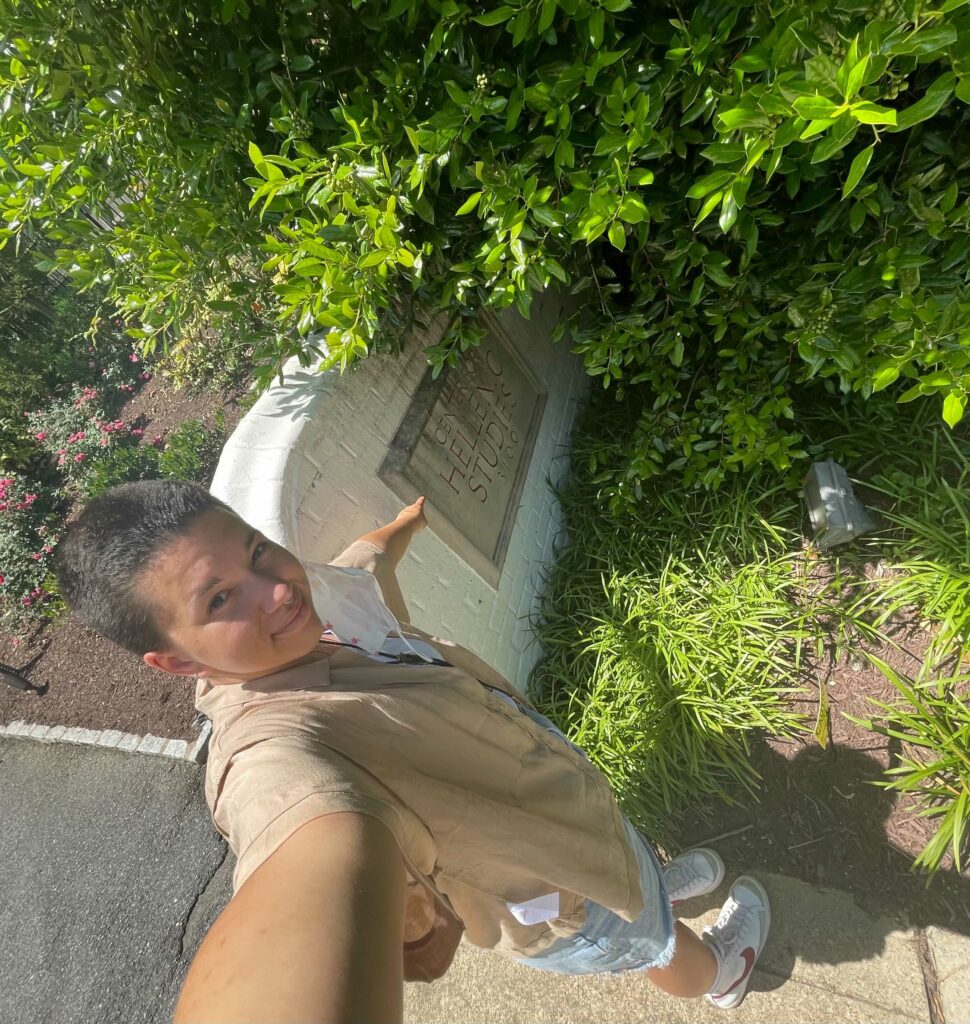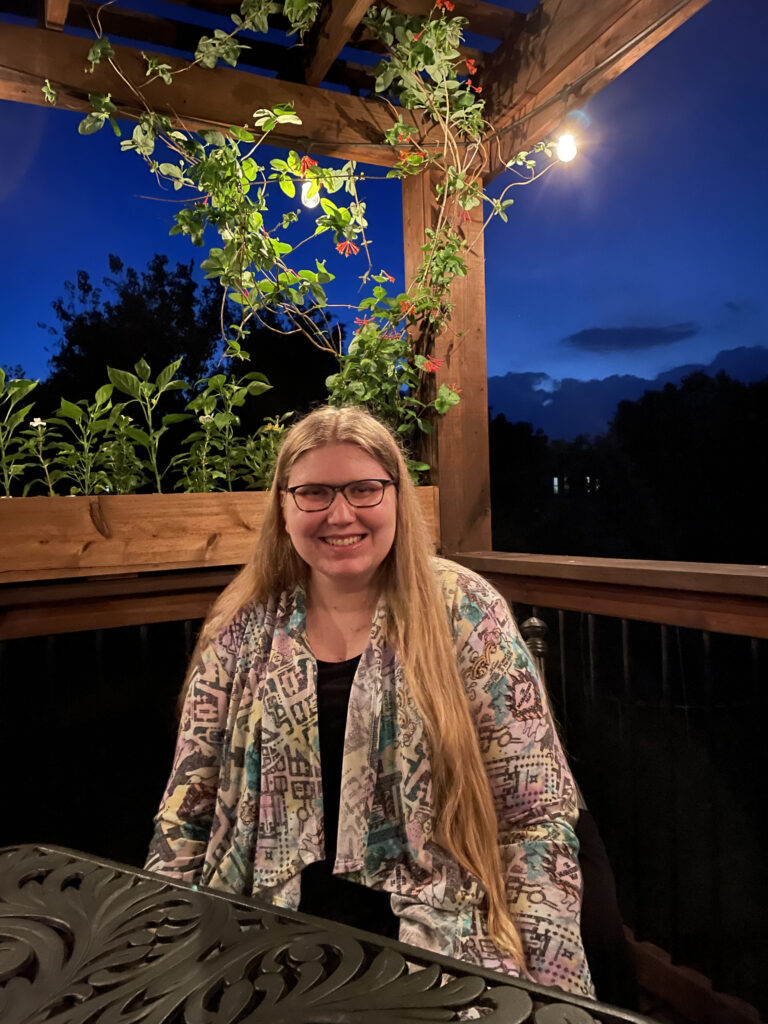Taylor Cassidy

As a summer Digital Humanities intern at the CHS, I had anticipated spending a sweltering summer in DC, working on converting XML files to go up on the Perseus Scaife Viewer and enjoying the CHS campus with undergrads from across the country. Covid had other plans, though. We interns pivoted to working on an entirely different part of the Open Greek and Latin Project [OGLP] process: hands-on editing work with OCR [Optical Character Recognition] in Lace and managing teams of volunteers across the world doing the same. It was my first time doing this kind of digital humanities work, and I absolutely loved it. Learning to use OCR software remotely should have been a challenge, but I quickly became close friends and colleagues with the other interns through weekly Zoom meetings and endless Slack messages. We may not have been able to spend time together in person, but we saw bits and pieces of each other’s lives through pet pictures and meeting backgrounds. Remote, asynchronous work also meant our teams could host numerous international volunteers. I was so fortunate to meet so many smart, talented people of all ages from across the US, Greece, Italy, Turkey, and Slovenia. We got to read and work on classical texts I had never even heard of before, and together we learned about early Christian authors and the many different kinds of scholia that exist. The work my team produced greatly exceeded my expectations. My team completed three texts in their entirety and contributed to a fourth, larger one. As an undergrad I struggled to find free, digital resources while completing my senior thesis in the middle of the pandemic, so I felt very grateful to contribute to this level of digital humanities project. This work is so important, and I know all of us contributing to the OGLP are a testament to the fact that this kind of open source digital humanities work is beyond possible. My only hopes are that some day I’ll have the pleasure of meeting my teammates, fellow interns, and CHS staff in person, and that this is only the beginning of many years working with the CHS.
Kelli Frangoulis

As the COVID-19 pandemic continued to grow last spring, my conversations were flooded with stories of friends whose summer internship experiences had been cancelled. I was worried because I had landed the dream internship with the Center for Hellenic Studies: a whole summer in Washington DC, working on a project to preserve ancient texts and joining a community of other people excited about that mission. So, when I heard from the Center for Hellenic Studies that my internship hadn’t been cancelled but instead postponed, I was relieved. Now a full year and a half later, I’m even more grateful that I was finally able to participate in this project.
The project was the First Thousand Years of Greek project, a subproject of the Open Greek and Latin Project [OGLP], devoted to collecting one edition of every Greek text composed between the time of Homer and 250 CE. This summer, I was able to participate as a Trainer, or someone who organizes and aids a group of volunteers in correcting OCR output that comes from scans of texts collected. We carried out other steps as well, including zoning the page to indicate which parts belonged to the primary Greek text as opposed to the possible translation, notes, title, or page numbers also included on the page. Finally, we added in URNs, or references to denote different sections of the text. In a few months, thanks to my incredible volunteers, the five volumes my team completed will be widely accessible on the Perseus Scaife Viewer, where everyone from Classics scholars to people casually interested in the field can interact with them. It is projects like this that help promote the idea that Classics is for everyone, and I’m honored to have been a part of it this summer.
One of the best things about Classics is the passionate, devoted, and caring people that make up the modern community. I was blown away by the dedication of my volunteers- not just to completing the work but making sure it was done carefully and with accuracy. The people on my team were always positive, always eager, and always happy to help, and I think that is reflected in the work we completed. My experience was also made by all of those behind the scenes. Particularly Bruce Robertson, Lia Hanhardt, and my fellow interns -Em Setzer, Taylor Cassidy, and Elizabeth Zollner- all made this experience even better with their support and devotion to making this summer positive and fruitful, despite being online. Even though I was supposed to share this experience with them in person, I’m incredibly thankful for the virtual interactions we’ve been able to have this summer and super proud of everything we’ve accomplished together in such a short time.
Em Setzer

This summer I occupied a relatively unique position within the ranks of Trainers for the Open Greek and Latin Project- Volunteer Program. In the spring of 2020, I was fortunate enough to receive an internship with the Center for Hellenic Studies. However, since the spring of 2020 was a decidedly hectic (one might even say unprecedented) time, the CHS offered the small band of interns I was a part of the option to defer our work until the following summer. This is how we found ourselves in 2021, being trained to manage a team of volunteers for the OGLP – a slightly different job than the one we were hired for a year ago.
While I can’t speak for the other three interns who were hired alongside me, I started the Summer Session with feelings of gratitude to the CHS, enthusiasm for working in a field I love, and nervous anticipation for the unfamiliar experience which awaited me. Now, having just wrapped up the final touches of my team’s work, I can say that working within the OGLP Volunteer Program was every bit as fulfilling as I’d hoped it would be. My day-to-day proceedings revolved around my team of volunteers, who worked to prepare a digitized text from antiquity for its new life – accessible and free – on the Perseus Scaife Viewer. Each volunteer edited our text, Origen’s Commentarii in evangelium Joannis, making sure it was as accurate as possible, and I instructed, streamlined, and reviewed their work, so all they had to do was focus on the Greek. Not only did I end up with a new lexicon by the end of the summer – one equally tailored to Optical Character Recognition as it is to ancient alphabets – but my managerial work as a trainer has put me into contact with an invaluable network of Classically-minded people. Amongst my team were high school students, college professors, and even Latin-enthusiasts who had no prior experience with Greek, all of us brought together by a common goal of bettering the study of Classics.
In the midst of the pandemic, my time with the OGLP’s Volunteer Program has been one defined by community. I’m incredibly grateful to have gotten to work with the good folks at the CHS, as well as others from OGLP’s various partners. More than anything, I’m so proud of my team for a summer spent contributing their time and energy to a fantastic cause. If anything, I’m glad they can say there’s nobody more intimately familiar with Origen’s thoughts on the Gospel of John – save for Heracleon, perhaps.
Elizabeth Zollner

I originally applied for this internship in March 2020. The plan was that I would travel to the Center for Hellenic Studies in June and remain there for the entire summer. I was very excited at the chance to spend the summer in Washington DC! Of course, then the Covid-19 pandemic struck. My internship was deferred to the next summer. However, things were still uncertain in the summer of 2021, so my internship became virtual. While I wouldn’t get to travel to Washington DC, there were many benefits to doing a Digital Humanities internship virtually.
For my internship I was a trainer for the new Volunteer Program for the Open Greek and Latin Project. In addition to learning how to edit texts on the Lace: Greek OCR site, I also learned how to teach a group of volunteers the process. Through Zoom meetings, Slack messages, and spreadsheets, I organized and managed my team of volunteers over the summer session. Even though we just met over Zoom, I loved getting to know the other interns, and we had a lot of fun during our weekly meetings. One of my favorite parts of this internship was getting to know all of the volunteers on my team. They came from a variety of backgrounds: some were university students, some were teachers, and others were people who work in different fields but wanted to use their Classics background. Because of the virtual nature of the project, the volunteers were from all around the world, including a number from Greece. It was great to see that so many people were interested in the project, and I had a great time talking with them about Classics. This project was a bright spot of joy during uncertain times. While it wasn’t what I was expecting when I applied for this internship, it was a wonderful experience I really appreciate being a part of. I hope that I’ll get to work with the Center for Hellenic Studies again in the future.
